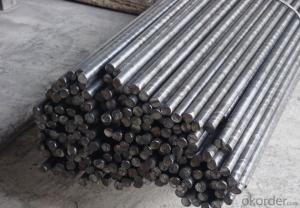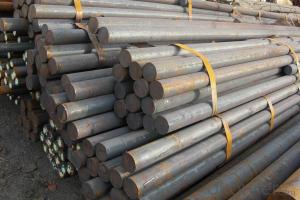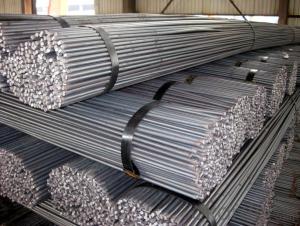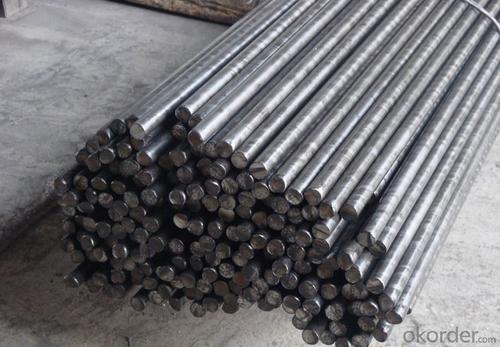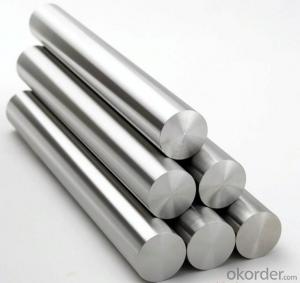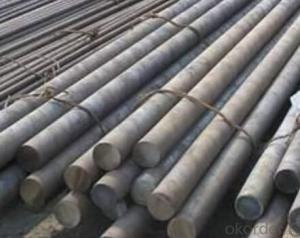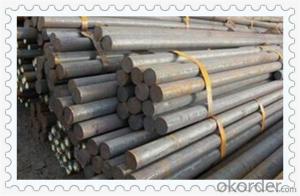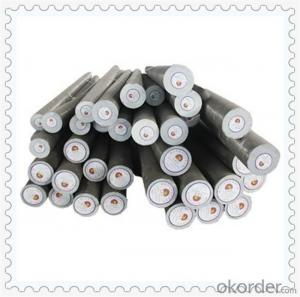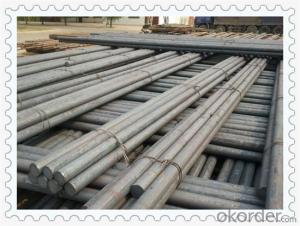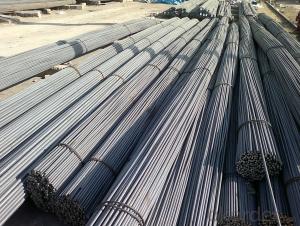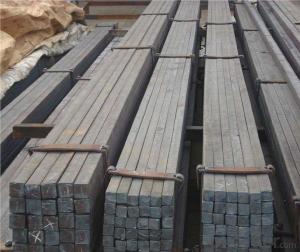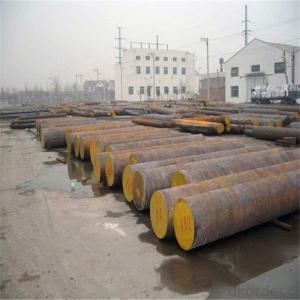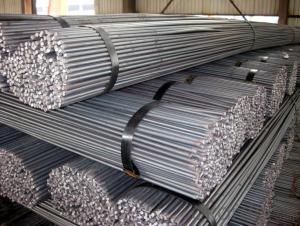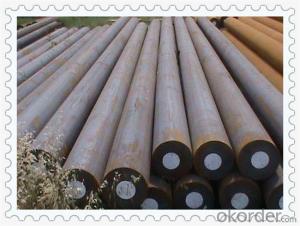Hot Rolled Mild Round Steel Bar Q235, SAE1020,SAE1045
- Loading Port:
- Shanghai
- Payment Terms:
- TT or LC
- Min Order Qty:
- 25 m.t.
- Supply Capability:
- 200000 m.t./month
OKorder Service Pledge
OKorder Financial Service
You Might Also Like
Product Description:
OKorder is offering Hot Rolled Mild Round Steel Bar Q235, SAE1020,SAE1045 at great prices with worldwide shipping. Our supplier is a world-class manufacturer of steel, with our products utilized the world over. OKorder annually supplies products to European, North American and Asian markets. We provide quotations within 24 hours of receiving an inquiry and guarantee competitive prices.
Product Applications:
Hot Rolled Mild Round Steel Bar Q235, SAE1020,SAE1045 are ideal for structural applications and are widely used in the construction of buildings and bridges, and the manufacturing, petrochemical, and transportation industries.
1. Chinese standard steel bar is often used where large amounts of steel need to be formed, for example as structural steel.
2. And we can use this kind of product on the performance of the mechanical parts if the demand is not very high.
3. Steel round bar is used in construction and a large number of architectural and engineering structures.
Product Advantages:
OKorder's Hot Rolled Mild Round Steel Bar Q235, SAE1020,SAE1045 are durable, strong, and resist corrosion.
Main Product Features:
· Premium quality
· Prompt delivery & seaworthy packing (30 days after receiving deposit)
· Corrosion resistance
· Can be recycled and reused
· Mill test certification
· Professional Service
· Competitive pricing
Specifications of Hot Rolled Mild Round Steel Bar Q235, SAE1020,SAE1045
1. Grade: Q195, Q235, Q345
2. Diameter: 6mm-150mm
3. Length: 6m, 9m, 12m or as customer’s request
4. Tolerance: Within ±5% for weight; ±2mm for diameter
5. Note: The price can be better is the quantity is good
6. Chemical composition
Alloy No | Element (%) | ||||
C | Mn | S | P | Si | |
Q195 | 0.06-0.12 | 0.25 | ≤0.05 | ≤0.045 | ≤0.3 |
Q235 | 0.12—0.20 | 0.3—0.7 | ≤0.045 | ≤0.045 | ≤0.3 |
Q345 | ≤0.2 | 1.00-1.60 | ≤0.045 | ≤0.045 | ≤0.55 |
Packaging & Delivery of Hot Rolled Mild Round Steel Bar Q235, SAE1020,SAE1045
Packaging Detail: All goods are packed in bundle with steel strips and shipped by break bulk vessel or container (depend on target market and different ports)
Delivery Detail: 45 days
Trade terms: FOB, CFR, CIF
MOQ: 25 tons per specification; we can negotiate the quantity if the specification is normal or we have stock of one specification.
Weight: Theprice invoicing on theoretical weight basis or actual weight basis depends on customer’s request.
Shipment: The shipment of bulk break or container is depends on customer’s request and the situation of the port of destination.
Documents given: Full set of original clean on board bill of lading; Original signed commercial invoice; Original packing list; Policy of insurance; Certificate of origin and what the target market needs.
Production Flow of Hot Rolled Mild Round Steel Bar Q235, SAE1020,SAE1045
1. The common processes are preheated forging quenching, dual refinement solution process, cooling quenching and isothermal quenching. We use heat treatment for dual refinement solution process.
2. Material prepare (billet) — heat up — rough rolling — precision rolling — cooling — packing — storage and transportation
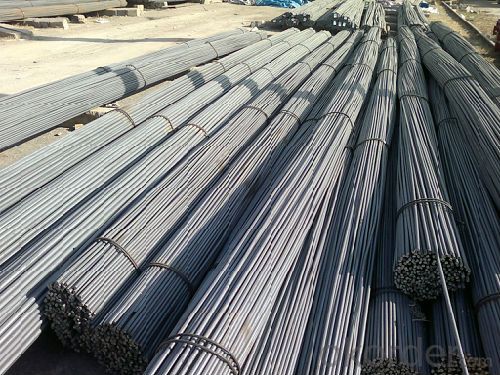
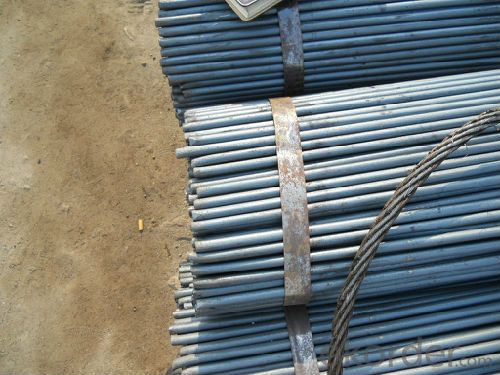
FAQ:
Q1: Can fit in the containers of 20fts Hot Rolled Mild Round Steel Bar Q235, SAE1020,SAE1045 of 6M?
A1: No proble, we can put them into the containers in the form sideling.
Q2: How soon can we receive the product after purchase?
A2: Within three days of placing an order, we will begin production. The specific shipping date is dependent upon international and government factors, but is typically 7 to 10 workdays.
Q3: How do we guarantee the quality of our products?
A3: We have established an advanced quality management system which conducts strict quality tests at every step, from raw materials to the final product. At the same time, we provide extensive follow-up service assurances as required.
- Q: What are the different types of steel round bars used in the manufacturing of valves and fittings?
- There are several different types of steel round bars commonly used in the manufacturing of valves and fittings. These include: 1. Carbon Steel Round Bars: Carbon steel round bars are the most commonly used type of steel in valve and fitting manufacturing. They are known for their strength, durability, and ability to withstand high temperatures and pressures. 2. Stainless Steel Round Bars: Stainless steel round bars are highly resistant to corrosion, making them ideal for use in valves and fittings that come into contact with liquids or gases. They are also known for their high strength and excellent mechanical properties. 3. Alloy Steel Round Bars: Alloy steel round bars are made by adding various alloying elements such as chromium, manganese, and nickel to carbon steel. This enhances their strength, hardness, and resistance to wear and tear, making them suitable for use in demanding valve and fitting applications. 4. Duplex Steel Round Bars: Duplex steel round bars are a type of stainless steel that contains a balanced mix of ferrite and austenite phases. This gives them a unique combination of excellent strength, corrosion resistance, and resistance to stress corrosion cracking, making them suitable for use in valves and fittings exposed to harsh environments. 5. Nickel Alloy Round Bars: Nickel alloy round bars are known for their exceptional resistance to corrosion and high-temperature applications. They offer excellent mechanical properties and are commonly used in valves and fittings that handle corrosive fluids or operate in extreme temperatures. It is important to select the appropriate type of steel round bar for valve and fitting manufacturing based on the specific requirements of the application, considering factors such as pressure, temperature, fluid compatibility, and environmental conditions.
- Q: Can steel round bars be used in the manufacturing of fasteners?
- Indeed, fasteners can be manufactured using steel round bars. Frequently, these bars serve as the fundamental materials for producing screws, bolts, and nuts. The circular form of the bars permits effortless molding and machining, enabling the fasteners to conform precisely to the desired specifications. Moreover, steel, being robust and durable, imparts the essential strength and resilience indispensable for fasteners to endure diverse applications and strains. Consequently, due to their mechanical properties and adaptability, steel round bars find widespread application in fastener production.
- Q: Are steel round bars suitable for food processing applications?
- No, steel round bars are not suitable for food processing applications.
- Q: What is the maximum length of a steel round bar?
- The length of a steel round bar can vary depending on several factors, including the bar's diameter, the manufacturing capabilities of the steel supplier, and transportation restrictions. Typically, steel round bars are made in standard lengths ranging from 6 to 12 meters (20 to 40 feet). However, it is possible to create longer bars through specialized processes or by combining multiple bars using welding techniques. In certain cases, it is possible to order custom-made steel round bars that exceed standard lengths, but this would necessitate making specific arrangements with the supplier and considering logistical and handling aspects during transportation. Ultimately, the maximum length of a steel round bar is determined by practical limitations and the specific requirements of the project or application.
- Q: What is the difference between a bright and a cold finished steel round bar?
- A bright steel round bar refers to a steel bar that has undergone a process called bright drawing, which involves passing the bar through a series of dies to achieve a smooth and shiny surface finish. On the other hand, a cold finished steel round bar is produced by cold drawing, which involves pulling the bar through a die to reduce its diameter and improve its dimensional accuracy. The cold finishing process does not result in a bright and shiny surface like bright drawing does, but it enhances the mechanical properties and overall quality of the bar.
- Q: What are the different heat treatment methods for steel round bars?
- There are several heat treatment methods that are commonly used for steel round bars to enhance their mechanical properties and improve their overall performance. These methods include annealing, normalizing, quenching, tempering, and case hardening. 1. Annealing: This heat treatment process involves heating the steel round bars to a specific temperature and holding it there for a certain amount of time to achieve a uniform microstructure. Annealing helps to relieve internal stresses, increase ductility, and improve machinability. 2. Normalizing: In this method, the steel round bars are heated to a temperature slightly above their critical transformation temperature and then cooled in still air. Normalizing refines the grain structure of the steel, improves its mechanical properties, and enhances its resistance to impact and fatigue. 3. Quenching: Quenching involves heating the steel round bars to a temperature above its critical temperature and then rapidly cooling it by immersing it in a quenching medium such as oil, water, or brine. This rapid cooling hardens the steel, making it stronger and more resistant to wear and abrasion. However, quenched steel can be brittle, so additional heat treatment steps may be required. 4. Tempering: After the quenching process, the steel round bars are often tempered to reduce brittleness and improve toughness. Tempering involves reheating the quenched steel to a specific temperature and holding it there for a specific time, followed by slow cooling. This process helps to reduce internal stresses, increase ductility, and improve the steel's overall toughness and machinability. 5. Case Hardening: Case hardening is a surface heat treatment method used to increase the hardness of the outer layer of the steel round bars while maintaining a relatively softer core. This process involves heating the steel in a carbon-rich environment, such as a gas or salt bath, and then quenching it to achieve a hardened outer layer. Case hardening improves wear resistance and fatigue strength, making the steel suitable for applications where high surface hardness is required. It's important to note that the specific heat treatment method used for steel round bars depends on the desired mechanical properties and the intended application of the product. Manufacturers carefully select the appropriate heat treatment method based on factors such as the composition of the steel, the desired hardness, and the required strength.
- Q: Can steel round bars be galvanized?
- Yes, steel round bars can be galvanized. Galvanizing is a process of coating steel with a layer of zinc to protect it from corrosion. This process is commonly used to increase the longevity and durability of steel products, including round bars.
- Q: What are the advantages of using cobalt-alloy steel round bars?
- Using cobalt-alloy steel round bars in various industries and applications offers several advantages. Firstly, this type of steel is exceptionally strong and hard, providing resistance against wear, corrosion, and high temperatures. This makes it suitable for demanding environments where other materials would quickly degrade. Secondly, cobalt-alloy steel maintains its shape and size even under extreme conditions, demonstrating excellent dimensional stability. This makes it ideal for applications that require precise tolerances and minimal deformation, such as in the aerospace and automotive industries. Moreover, cobalt-alloy steel retains its mechanical properties at elevated temperatures, showcasing excellent heat resistance. This makes it valuable in applications involving high-speed machining, cutting tools, and turbine components. Additionally, cobalt-alloy steel round bars are easily machined and fabricated, offering versatility and customization in various applications. Their high machinability and weldability make them suitable for use in manufacturing processes like forging, casting, and machining. Furthermore, cobalt-alloy steel round bars exhibit excellent fatigue resistance, ensuring long-lasting performance and durability. This makes them suitable for applications involving repetitive stress or cyclic loading, such as shafts, springs, and fasteners. Lastly, cobalt-alloy steel is biocompatible, making it suitable for medical and dental applications. Its corrosion resistance and biocompatibility properties make it commonly used in orthopedic implants, surgical tools, and dental instruments. In conclusion, the advantages of using cobalt-alloy steel round bars include exceptional strength, hardness, and dimensional stability, as well as heat resistance, machinability, fatigue resistance, and biocompatibility. These qualities make them valuable across a wide range of industries and applications, offering reliability, durability, and performance.
- Q: What are the standard sizes of steel round bars?
- The sizes of steel round bars can vary depending on the country and specific industry standards. Typically, these bars come in a wide range of diameters, starting from 6mm (0.24 inches) and going up to 400mm (15.75 inches) or even larger. For commercial purposes, commonly used sizes include 10mm (0.39 inches), 12mm (0.47 inches), 16mm (0.63 inches), 20mm (0.79 inches), 25mm (0.98 inches), and 32mm (1.26 inches). However, it's important to note that these sizes may differ in various regions and industries. Additionally, specialized applications may require unique dimensions. Therefore, it's always advisable to refer to the relevant industry standards or consult with suppliers to determine the specific standard sizes for steel round bars in a particular context.
- Q: What are the different types of steel round bar alloys for improved machinability and strength?
- There are several different types of steel round bar alloys that are specifically designed to offer improved machinability and strength. These alloys are commonly used in various industries where the ability to machine components efficiently while maintaining high tensile strength is crucial. Some of the most popular steel round bar alloys for improved machinability and strength include: 1. 12L14: This alloy contains lead, which acts as a lubricant during machining, resulting in improved chip formation and reduced tool wear. It offers excellent machinability and good strength, making it suitable for applications that require intricate machining processes. 2. 4140: Also known as "chromoly" steel, this alloy contains chromium and molybdenum, which enhance its strength and hardenability. 4140 steel round bars are widely used in applications that require high tensile strength, such as automotive parts, shafts, and gears. 3. 8620: This alloy is a low-alloy nickel-chromium-molybdenum steel that offers a combination of high strength and good toughness. It can be easily machined and is often used in applications that require case-hardening, such as gears, shafts, and fasteners. 4. 1018: Known as "cold-rolled" or "cold-finished" steel, 1018 is a low-carbon steel alloy that offers good machinability and weldability. It is commonly used in applications where precise and smooth finishes are required, such as in the manufacturing of bolts, screws, and hydraulic fittings. 5. 52100: This alloy is a high carbon, chromium-bearing steel that is primarily used in the manufacturing of bearings and other high-wear applications. It offers excellent hardness, wear resistance, and machinability, making it suitable for components that require high strength and durability. These are just a few examples of the different types of steel round bar alloys available for improved machinability and strength. The choice of alloy depends on the specific requirements of the application, such as the desired strength, machinability, and durability. Consulting with a materials engineer or supplier can help determine the most suitable alloy for a particular use case.
Send your message to us
Hot Rolled Mild Round Steel Bar Q235, SAE1020,SAE1045
- Loading Port:
- Shanghai
- Payment Terms:
- TT or LC
- Min Order Qty:
- 25 m.t.
- Supply Capability:
- 200000 m.t./month
OKorder Service Pledge
OKorder Financial Service
Similar products
Hot products
Hot Searches
Related keywords
